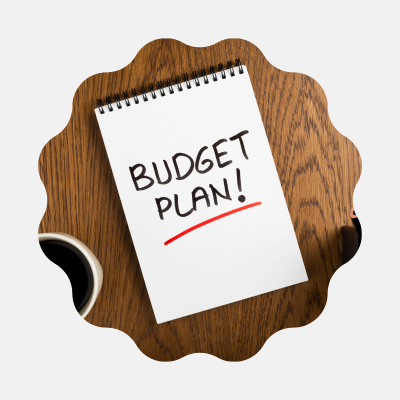Introduction:
One foundational element reigns supreme in the quest for financial stability: budgeting.
Budgeting is not merely a chore or a restrictive tool but the blueprint for a solid financial foundation. By understanding the basics of budgeting, you can gain control over your finances, achieve your goals, and create a brighter financial future. In this post, we will delve into what budgeting is, why it is essential, and how you can start.

What is Budgeting?
At its core, budgeting creates a plan for your money. It involves tracking your income, expenses, and savings to ensure you live within your means while working toward your financial objectives.

Why Budgeting Matters:
Financial Awareness: Budgeting visually represents where your money is coming from and where it is going. With this knowledge, it will help you make informed financial decisions.
Debt Management: You may strategically allocate funds to repay debts with the budget. A budget aids you in prioritizing and managing these obligations, whether it is credit card debt, student loans or mortgages.
Savings and Investments: Budgeting will enable you to allocate a portion of your income into savings, whether it is an emergency fund, retirement account or other financial goals.
Examples of budget management in practice: The 50/30/20 Rule:
You should allocate 50% of your income to your needs (rent/mortgage, utilities, groceries).
Then 30% goes to wants (entertainment, dining out, hobbies).
Finally, for the future, save or invest 20%.
Methods of Budgeting
Envelope Budgeting:
In this method, you allocate cash into different envelopes labelled for specific spending categories. Once an envelope is empty, you can only spend more in that category during the next budgeting period.
Zero-Based Budgeting:
It would be best to assign every dollar a purpose in this method. Your goal is to “zero out” your budget, meaning your income minus expenses equals zero. It encourages you to give every dollar a job, whether saving, investing, or paying off debt.
The 60% Solution:
This approach encourages you to use 60% of your income to cover your fixed expenses (needs) and the remaining 40% for variable expenses (wants and savings).
Setting up a budget
Income and Expenses: Start tracking your income and expenses by documenting your sources of income and all your expenses and dividing expenses by fixed costs like rent and utility bills as well as variable ones, such as dining out or entertainment. Get a copy of the “2024 Planner with Yearly Goal and Budget PDF” and start tracking your income and expenses.
Establish Financial Goals: Define your short and long-term goals, which involve setting up an emergency fund, planning a vacation or paying off debts.
Creating a budget: When dividing your earnings by various categories of expenses and savings targets, use one of the earlier methods.
Stick to Your Budget: Consistency is vital. Update your budget regularly and make any adjustments as needed. Be mindful of your spending habits and make conscious choices that align with your financial goals.
Conclusion:
Budgeting is the cornerstone of financial stability. It empowers you to manage your money efficiently, take control of your finances, and work towards your dreams. While budgeting may require discipline and adjustments, the financial security and peace of mind it provides are well worth the effort. Start building your solid financial foundation today by embracing the power of budgeting. Get a copy of the “2024 Planner with Yearly Goal and Budget PDF” and start tracking your income and expenses.

